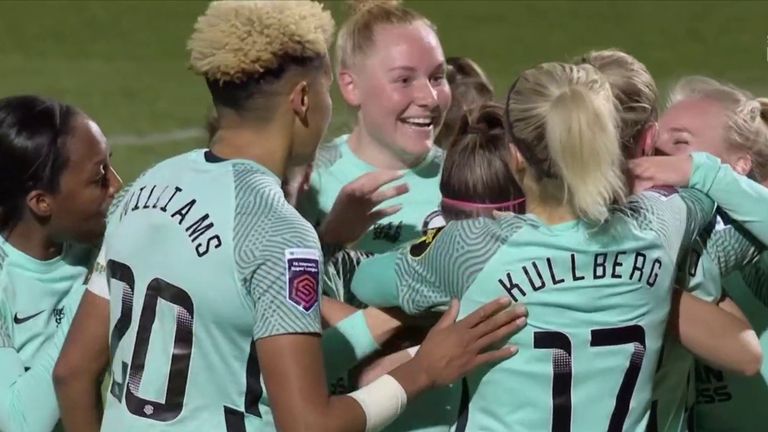PFA outlines pioneering reforms as pursuit of absolute parity for women's game continues
PFA confirms significant policy changes to contracts in women's game relating to maternity provision, injury and illness, and termination of long-term injury; Players' union calls for widespread adoption to avoid creation of two-tier employment system in women's game
Tuesday 1 February 2022 21:47, UK
The Professional Footballers' Association has warned there is much work to be done to achieve parity between female players and their male counterparts after outlining pioneering contract reforms in the women's game.
After 16 months of negotiations with The Football Association, the PFA has secured 'significant policy changes' that could apply to players at all 24 clubs across the Women's Super League and Women's Championship.
The reforms see the introduction of a comprehensive Family Leave Policy, which provides players with additional protection if they have children during their career, a provision which was previously at the discretion of clubs.
The disparity in contractual rights between male and female players in relation to injury, illness, and the termination period of contracts has been addressed by improvements to the Standard WSL contract.
'Wildly different conditions clearly not right'
"Take two England internationals who play for the same club - one in the Premier League, one in the WSL," PFA Director of Women's Football, Marie-Christine Bouchier, explained.
Trending
- Man City 2-0 down at Juve and in CL elimination danger LIVE!
- Arsenal hanging onto lead vs Monaco LIVE!
- Chelsea running riot as Twente rack up defensive errors LIVE!
- Sheff Utd, WBA lead | Five games on Sky Sports+ LIVE! & highlights
- Live Champions League table
- Spurs latest: Romero apologises for comments as Ange confirms injury woe
- Man Utd latest: Talks opened for Paraguayan teenager Leon
- Transfer Centre LIVE! Van Dijk: 'No word' on Liverpool contract talks
- Astana vs Chelsea preview: Acheampong among youngsters drafted in
- Amorim: Ashworth exit 'not best situation' - but 'doesn't change' anything
"If both of players suffer the same serious injury on the same day, under the existing WSL contract, a player can be dismissed by their club if a medic thinks the injury will prevent them from playing for three consecutive months. In that instance, the player only has the right to a three-month notice period.
"However, for the Premier League player, the injury would need to keep them out for 18 months in any consecutive 20-month period before their contract could be terminated. In that situation, they would have the right to a 12-month notice of termination.
"Those are wildly different conditions for players who could suffer from the same injury playing for the same club. It clearly wasn't right."
'Risk of creating two-tier system if changes aren't adopted'
The players' union has called for widespread implementation of the proposals to avoid creating an arbitrary 'two-tier' status among female players who are playing under their old contracts.
"It is vital the new changes are adopted by all, as opposed to being implemented on a piecemeal basis, as each player enters into a new contract," Bouchier added.
"We can't have a situation where players are expected to continue working under what is now agreed as a deficient employment contract. It is not acceptable to create a two-tier employment system."
Despite notice periods on injury and illness having been addressed, Bouchier insists significant work remains in other areas, such as contractual 'options'.
"It is common in professional football for contracts to include an 'option' on a player, allowing a club to extend the deal if they want to retain the player for a longer period," Bouchier explained.
"However, the current notification period outlined in the Standard WSL Contract could leave some players in limbo when their deal ends. Players can find themselves in a situation where their contract has expired, but the club can wait a further week to decide whether they activate the option or release the player.
"In the men's game, players get advance notice from their club, which allows them to make plans for their future. We are confident this will be remedied imminently, but again, it's just a basic issue of fairness."







